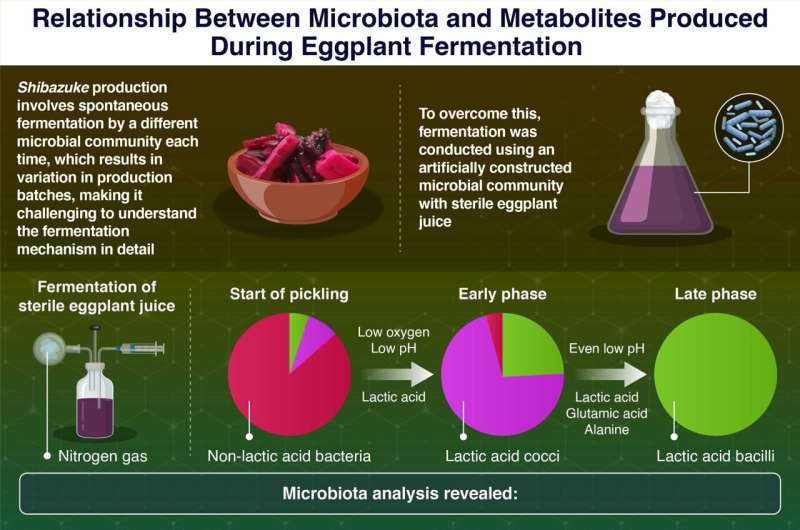This article has been reviewed according to Science X's editorial process and policies. Editors have highlighted the following attributes while ensuring the content's credibility:
fact-checked
trusted source
proofread
Exploring the effects of initial microbiota on microbial succession during eggplant fermentation

Shibazuke is a traditional Japanese eggplant pickle produced by the process of fermentation using lactic acid bacteria (LAB). LAB which are commonly present in vegetables cause the spontaneous fermentation of vegetables, resulting in the distinctive acidic flavor of pickles.
While LAB are beneficial, other species of bacteria and microbes that may be present in the food source can affect the food quality and safety. Advancements in the areas of food technology and nutrition have allowed the large-scale fermentation of pickles via industrial fermenters, where conditions that affect fermentation like temperature, pH-acid levels, and salt content are closely monitored.
The important role of specific microbial populations in spontaneous fermentation and their interactions that influence the overall quality of fermented products have been vastly studied. However, studies to replicate spontaneous fermentation involving sterile raw materials and artificially constructed microbiota are limited.
In a bid to reveal the complex microbial succession-changes in microbial populations during spontaneous fermentation and its effects on the final products, Associate Professor Takuji Yamada from School of Life Science and Technology, Tokyo Institute of Technology, Japan and Dr. Kazunori Sawada from Innovation Division, Gurunavi, Inc., Japan have conducted a novel study utilizing industrially produced shibazuke. Their research findings were published in the Microbiology Spectrum journal.
Sharing the inspiration and rationale behind the present research work, Yamada's team says, "Investigation into the changes in microbial populations during the eggplant fermentation process and understanding the dynamics between them can provide critical insights. Additionally, the important factors and underlying mechanisms that influence the metabolite composition in shibazuke can be revealed."
The researchers initially performed microbiota analysis of commercially produced shibazuke samples, employing 16S rRNA gene sequencing technique to study the characteristics of the microbial population. They observed two different patterns of microbial succession in shibazuke samples: One where the populations of LAB were replaced by aerobic bacteria, whereas the other pattern revealed the dominance of LAB till the end of fermentation.
The discovery of two distinct patterns of microbial succession motivated the researchers to model the production of shibazuke using an innovative research approach.
Subsequently, they inoculated filter-sterilized eggplant juice with an artificially constructed microbiota containing six species of bacteria that were observed during the early phase of shibazuke production. Microbiota analysis of eggplant juice fermentation indicated a single microbial succession pattern with LAB dominance, marked by the skewed growth of Lactiplantibacillus plantarum bacteria throughout the fermentation process.
Furthermore, the researchers conducted a correlation analysis to study the extent of similarities between shibazuke production and fermentation of eggplant juice. The fermentation profiles of dissolved oxygen and pH correlated with the microbial populations during fermentation and was found to be similar in both methods. Moreover, they identified L. plantarum to be involved in the production of lactic acid, alanine, and glutamic acid during shibazuke production and eggplant fermentation.
"The innovative model of eggplant juice fermentation developed by us can be easily extended to other spontaneous fermentation processes. Additionally, it can reveal the role of specific initial microbiota on fermentation and its final products," says Yamada team, emphasizing the potential applications of the research work.
This study could aid the development of superfoods that have enhanced nutritional profiles and probiotic products with good bacteria like L. plantarum.
More information: Kazunori Sawada et al, Influence of the initial microbiota on eggplant shibazuke pickle and eggplant juice fermentation, Microbiology Spectrum (2024). DOI: 10.1128/spectrum.00464-24
Provided by Tokyo Institute of Technology




















